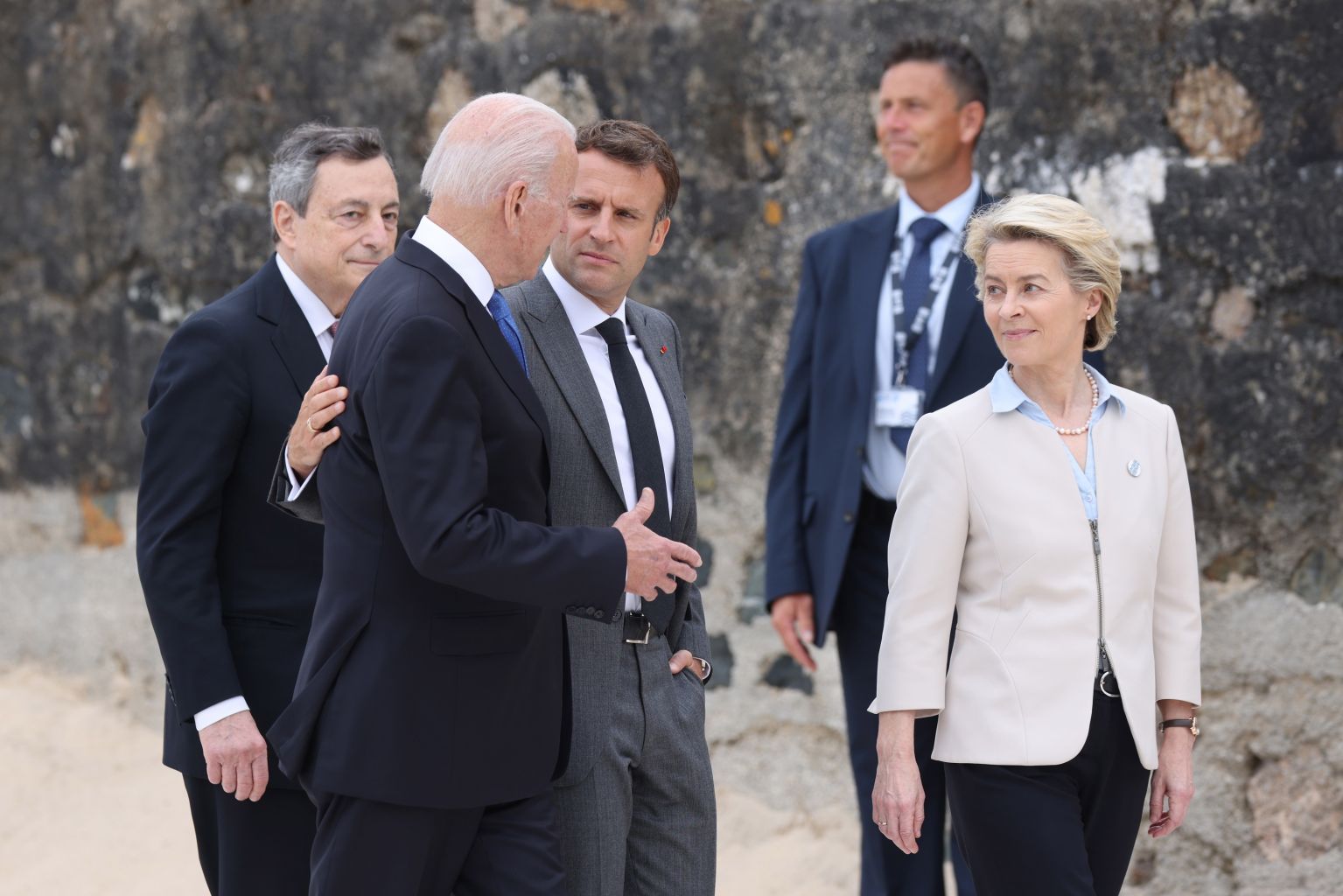Mixed emotions for France's Macron as US re-engages with world
Sign up now: Get ST's newsletters delivered to your inbox

Macron (third from left) walks with Biden on the first day of the G-7 summit in Britain, with Italian Prime Minister Mario Draghi (left) and European Commission preisdent Ursula von der Leyen (right).
PHOTO: EPA-EFE
CARBIS BAY, UNITED KINGDOM (AFP) - Emmanuel Macron wrapped his arm around Joe Biden's shoulders when they met for the first time on Friday (June 11) at the Group of Seven (G-7) summit in Cornwall.
But the warm gesture and small talk hid the French president's frustration over a raft of issues, as his US counterpart saddles up to fight a series of global battles.
The pair are due to meet for a bilateral meeting at the seaside resort of Carbis Bay in south-west England on Saturday morning, according to the Elysee.
Officials said their first exchanges on the beach focused on improving life for the middle classes, and confronting China "by defending our interests and values".
Macron, though, has been irked by Biden's bid to put the United States front and centre of global efforts to tackle climate change, tax multinationals, deal with Russia and donate vaccines.
The reason: he has been pushing the same issues since even before Biden was elected - and France has had to face the consequences from the United States under Donald Trump.
My idea
On Thursday, Macron said he was cautiously satisfied with Washington's foreign policy reversals, particularly on US relations with the European Union.
Last month, the Biden administration backed a minimum 15 per cent tax on multinationals, leading to the historic G-7 finance ministers' agreement last week.
The French president called it a "massive step towards fairer globalisation" but he was quick to point out he had been banging the drum for such a move for four years.
And, in the absence of any agreement, France had unilaterally slapped a tax on tech giants, prompting Trump to retaliate.
"I have in mind our wine growers and many, sometimes modest, companies who, over the last two years, have had to pay for the American backlash because we introduced a digital tax," he said.
"That's how it happened, let's not forget it."
US 'blockade'
Macron also gave a guarded welcome to Biden's announcement on Thursday that the United States would donate 500 million doses of Covid-19 vaccines to poorer countries.
The EU has promised to give 100 million doses, including 30 million from France.
"If it's 500 million doses by the end of 2021, that's great news and the EU has to match that announcement," he said.
But he added: "If it's by 2022, it's not the same thing."
And he failed to hide his scepticism about the US proposal to waive intellectual property on vaccines without time limits, as he himself agreed only to a temporary suspension.
"I am waiting to see the exact American proposal," Macron said, adding: "I don't think the United States will ever propose lifting intellectual property in perpetuity."
"I can more or less guarantee it as it means the end of innovation in your country almost immediately."
Macron also denounced what he called the "American blockade" on the export of materials that prevent vaccines being made overseas, which he hoped to see lifted at the G-7.
He called for laboratories - almost all of which are American - to donate 10 per cent of the doses they sell.
Baffled
Macron also welcomed Biden's announcement of a summit with Russia's Vladimir Putin but through gritted teeth, given the criticism he has faced for wanting to reach out to the Kremlin.
"I have always advocated dialogue," he said.
"I am sometimes surprised that those who think that France is wrong to talk say that the United States is right to talk.
"But there are sometimes things in life that escape me."
And he asked the Americans, as he did also with Trump, to clarify Nato's objectives, particularly towards China.
Going further, as a Nato summit looms on Monday where he will meet Biden again, he made the case for European military autonomy.
For this to happen, "we need enough European countries that have a complete army model, like France", he said, in another pointed message to Washington.
Europeans needed to "take on responsibility for arms control on their soil".


